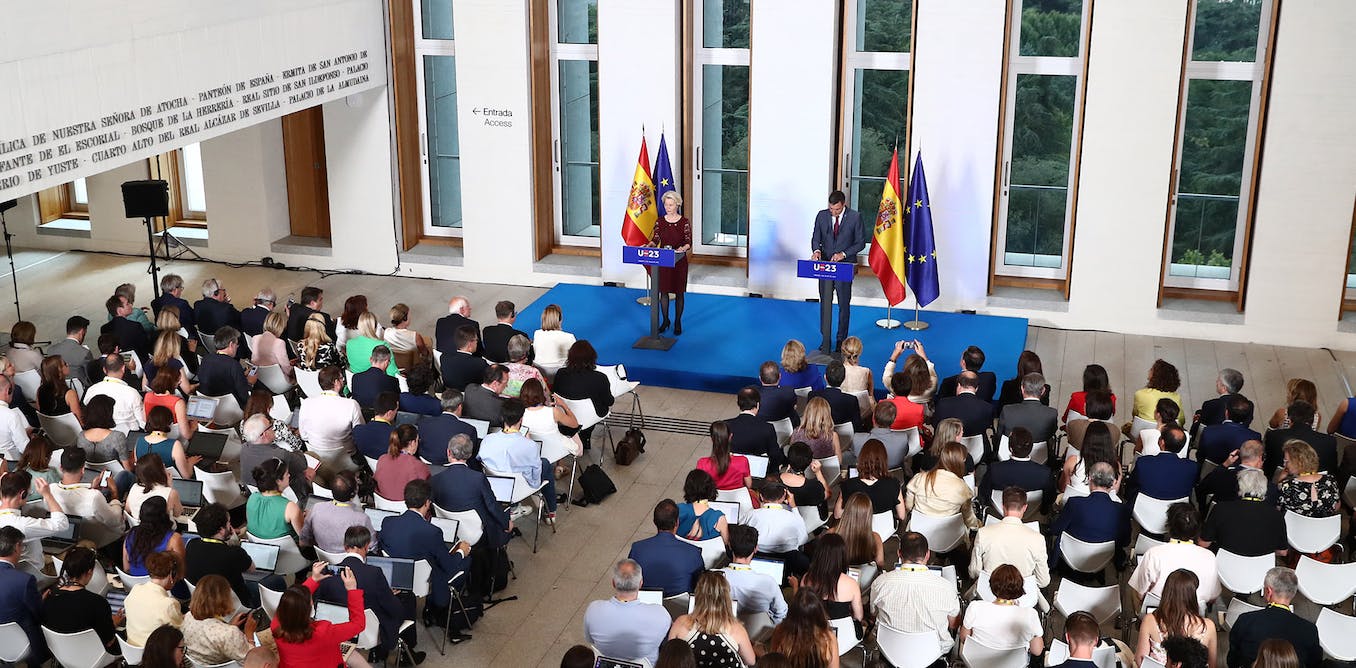A summit between the European Union (EU) and the Community of Latin American and Caribbean States (CELAC) will take place in Brussels on 17 and 18 July 2023 under the Spanish presidency of the Council of the EU. This meeting is important for both regions but, especially for Europe, given the current geopolitical pressures it is facing.
We live in a world in transition towards a new model that is still uncertain after Russia’s invasion of Ukraine. Alliances are being redrawn and globalisation redesigned. Europe is weakened on several fronts, including the overwhelming presence of foreign capital in major European companies and a worrying demographic decline.
This will be the ninth summit of the presidents of the 33 Latin American and Caribbean (LAC) countries and the 27 EU member states since the first one in Rio de Janeiro in 1999. Until 2015, summits were held periodically every two to three years. This summit should have been held in October 2017 in El Salvador, but it never took place.
The main reason was the extremely serious political and social situation in Venezuela at the time. Several concerned Latin American countries requested the summit be suspended and called on CELAC to speak out against Nicolás Maduro’s regime. CELAC also suffered four years of paralysis aggravated by the withdrawal of Brazil, which was recently reinstated.
The seismic consequences of Brexit, the pandemic and the dynamics of Latin American politics contributed to a long period without summits, a symptom of the fragile and artificial nature of the Bi-regional Strategic Partnership that was never really strategic.
European External Action Service, CC BY-SA
Cooled relations
The pandemic, the war in Ukraine and the Spanish presidency are the main factors that reactivated the EU-CELAC relationship at the highest level. The first two highlighted some of the EU’s major structural threats and weaknesses in terms of military dependence on NATO, Europe’s essential defence base, strategic industrial dependence and energy dependence – especially on Russia.
The attractiveness of LAC for the EU, standing out in key areas such as lithium, rare earths and other strategic minerals, energy or value chains, is essential for a Europe in the process of reversing the dependencies that put it at the feet of China, Russia and the US.
Spain takes the initiative
In this context of European vulnerability, the Foreign Affairs Council of 18 July 2022 agreed to “promote a qualitative leap in relations between the EU and LAC countries”, with Spain taking the initiative to hold the summit under its presidency of the EU Council.
The Spanish presidency prioritises relaunching relations with LAC. The objectives of the Spanish presidency range from guaranteeing the sustainability and regularity of summits to modernising the Mexico and Chile agreements and unblocking the agreement with Mercosur – the Southern American Common Market. It also includes green and digital alliances within the framework of the Global Gateway investment strategy.
The Spaniah general election of July 23 should not alter the planned agenda.
The EU needs a real strategic relationship with LAC, however complex and heterogeneous the region may be. This requires rethinking the model, perhaps abandoning the artificial EU-CELAC format, making way for a more pragmatic and balanced relationship that abandons rhetoric and accommodates asymmetries and divergences.
The idea should be to bring the association to a level where ideological and political differences are not an obstacle to progress in the relationship. The scenario has changed a great deal both inside and outside Latin America in this regard. At the last CELAC meeting, harsh accusations were levelled at less democratic regimes, but without losing the objective of advancing the relationship. The EU should also go along these lines.
It should also be based on concrete projects and strategic areas that allow for the articulation of more far-reaching alliances including in multilateral fora in which LAC could be moving further away from the EU.
One of the clearest examples of this would be the United Nations. LAC almost unanimously supports the EU in votes in the General Assembly. However, it cannot accompany it in the application of sanctions – its strategic vulnerability can’t assume the cost of sanctions. If, for example, the EU-Mercosur agreement were in force, this vulnerability would be reduced, which could allow the region to accompany the EU in sanctions –for example, if it was the case, against Russia.
If the EU does not make qualitative leaps towards having LAC as a strategic partner, the risk of it distancing itself in multilateral forums increases. This can be evident by the fact that countries such as Mexico and Argentina (among others) want to join the BRICS, which could have repercussions both in negotiations or conferences and in international organisations.
In this sense, the European Commission’s recent Communication “A New Agenda for EU-Latin America and Caribbean Relations” of 7 June offers new but uncertain hope.
What success would look like
The Spanish presidency has made a strategic commitment to LAC that will undoubtedly yield results, but will not work miracles.
The main success factor of the summit will be the abandonment of Eurocentrism. This will allow the EU to see overcome its dated vision of LAC as merely a source of manufacturing and raw materials and start understanding its nations as partners it needs to reduce its structural dependencies on other nations. It would also help to establish an institutional framework that could give sustainability and stability to the relationship, for example, with the potential of the EU-LAC Foundation as an international organisation.
The weight of the global south is growing and the BRICS are increasing their potential as leaders in innovation and energy transition. Taking that into account, the international value of Latin America and the Caribbean in the developing global scenario is incalculable.



